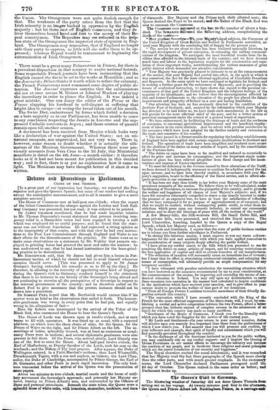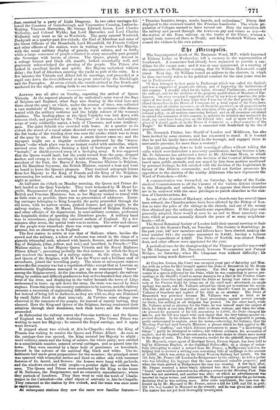ebr Gurete0 Eftstit to German.
The blustering weather of Saturday did not deter Queen Victoria from vetting out on her voyage. At twenty minutes past four in the aftern000, the Queen and Prince Albert left Buckingham Palace, in a carriage-and-
. four, escorted by a party of Light Dragoons. In two other carriages fol- lowed the Countess of Gainsborough and Viscountess Canning, Ladies-in- Waiting, Viscount Hawarden, Mr. George Edward Anson, Lord Charles Wellesley, and Colonel Wylde; but Lord Hawarden and Lord Charles ..-Wellesley only went as far as Woolwich. The party entered Woolwich Dockyard at a quarter-past five o'clock: the Earl of Aberdeen and some of the Great Officers of the Household, Lord Bloomfield, Sir Francis Collyer and other officers of the station, were in waiting to receive her Majesty, with the usual military display of guards, royal salutes, and so forth; while a large concourse of people collected in every accessible part greeted „the Sovereign with bursts of cheers. The Queen, plainly dressed in a cottage bonnet and black silk mantle, looked remarkably well, and graciously acknowledged the greeting of the people. The Prince also looked in excellent health and spirits. Her Majesty embarked without delay; the Earl of Aberdeen entering the yacht as part of the suite. In a few minutes the Victoria and Albert left its moorings, and proceeded at a • rapid rate down the river; followed at no great interval by the BlackEagle and the Porcupine. At seven o'clock, the vessels arrived at Sea Reach, and anchored for the night; setting forth to sea betimes on Sunday morning.
Antwerp was all alive on Sunday, expecting the arrival of Queen Victoria. At the topmost pinnacle of its cathedral's spire waved the flags of Belgium and England, other flags also floating in the wind here and there about the quay; on which, under the avenue of trees, was collected a vast multitude of Belgians, as gay in face as in costume—the dresses varied with the military uniforms and the bright colours of the women's boddices. The landing-place at the Quai Vandyke was laid down with crimson cloth, and guarded by the " Pompiers " or firemen, a half-military corps of truly soldierlike aspect, a body of Chasseurs, and some Artillery- .men. The quiet Scheldt was crowded with boats. At a quarter to six o'clock the sound of a royal salute directed every eye to seaward, and over the flat banks of the winding river was seen the yacht; which was in front of the quay by six. About this time a smart shower came on; and the voyagers might see a singular evolution performed by the "braves Beiges "—the whole place was in an instant roofed with umbrellas, which covered even the soldiers; forming a kind of burlesque on the ancient "testudo," or shield-covered troop of a besieging army. It was supposed That the Queen would land; but the yacht turned from the quay, dropped anchor, and swung to its moorings in mid-stream. Meanwhile, the Com- mandant of the Port, the Baron d' Arnim, Prussian Minister in Belgium, and Sir Hamilton Seymour, the British Minister, entered a boat and went on board to learn the Queen's pleasure. They received autograph letters from her Majesty to the King of Prussia and the King of the Belgians, announcing her arrival; and retiring, they left the travellers to pass the night at anchor.
At half-past six o'clock on Monday morning, the Queen and Prince Al- bert lauded at the Quai Vandyke. They were welcomed by M. Henri Le- g.relle, Burgomaster of Antwerp, and other local authorities, and by the British and Prussian Ministers; but, as her Majesty wished to travel with as little state as possible, there was no presentation of addresses. Enter- ing carriages belonging to King Leopold, the party proceeded through the old town, with its narrow streets, peaked houses, and gay people to the railway station; where M. Masui, Director-General of Belgian people, and other officials of his department, in semi-military costume, performed the hospitable duties of speeding the illustrious guests. A military band was in attendance, playing the national anthem of England. By a few -minutes after seven, the special train was in motion. The order and silence of the people were remarked: there was every appearance of respect and interest, but no cheering as in England.
The first station to arrive at was that of Malines; where, besides the -crowd and the military, a token of welcome was raised in the shape of a gigantic triumphal arch, adorned with laurels, flowers, and the tricoloured flag of Belgium, (blue, yellow, and red,) and inscribed, in French—" The }felines station: to her Majesty Queen Victoria and his Royal Highness Prince Albert "; presenting probably the first instance in which the Royal pair received the homage of a railway station. At this place, the King And Queen of the Belgians, with M. Van der Weyer and a brilliant staff of Attendants, joined the travelling party. The scene at subsequent stations across the flat country was but a repetition of this; except that at Louvain an enthusiastic Englishman managed to get up an unaccustomed " hurra" Among the Belgian, crowd. At the Ans station, the scene changed; the railway -rising by sudden and difficult gradients to four or five hundred feet above the level of the river, and displaying in the valley beneath the town of Liege
• embosomed in trees: up and down the steep, the train was moved by fixed engines. From this point the country continues to be uneven' and,the railway presents a succession of engineering difficulties. The tunnels are frequent; hut instead of being left in darkness, as they are with us, they are illumined by small lights fixed at short intervals. At Verviers some change was observed in the manners of the people; for instead of merely bowing, they cheered. Here the King and Queen of the Belgians, having conducted their relatives through their dominions, took their leave; and the travellers proceeded.
At Habersthal the railway enters the Prussian territory; and the Queen of England was hailed with deafening cheers. The Crown Prince was -waiting to meet her Majesty; he entered the Royal carriage, and it again 'went forward.
It stopped about two o'clock at Aix-la-Chapelle; where the King of Prussia was waiting to receive the Queen and Prince Albert. As soon as the carriage-door was opened, the King assisted her Majesty to alight : amid military music and the firing of salutes, the whole party, now swelled _to a considerable number, entered several carriages, and so passed into the town. They were escorted by a large body of gentlemen on horseback, dressed in the colours of the national flag, black and white. The in- habitants had made great preparations for the occasion: the principal street was spanned with triumphal arches and lined on either side with immense festoons of fir, laurel, and flowers: the houses were hung with garlands, and the windows crowded with people—a prettier sight has seldom been seen. The Queen and Prince were conducted by the King to the house of M. Nellessen, the Burgomaster, and an extensive manufacturer •' where they partook of luncheon. They then went to visit the tomb of Charle- magne in the Cathedral—the chief object of curiosity in Aix-la-Chapelle. They returned to the station by five o'clock, and the train was once more in rapid motion.
At subsequent stations they saw the same now familiar features—'
"Prussian beauties, troops, music, laurels, and enthusiasm." Duren fiat displayed to the crowned tourist the Prussian Ltuadwelu-. The whole po- pulation of Cologne seemed to have turned out. Here the travellers left the railway and passed through the town—as gay and ornate as any—to the station of the Bonn railway, on the banks of the Rhine; whence a \ special train conveyed them to 13ruhl; and King Frederick William end- \ corned the visitors in his own palace.



























 Previous page
Previous page